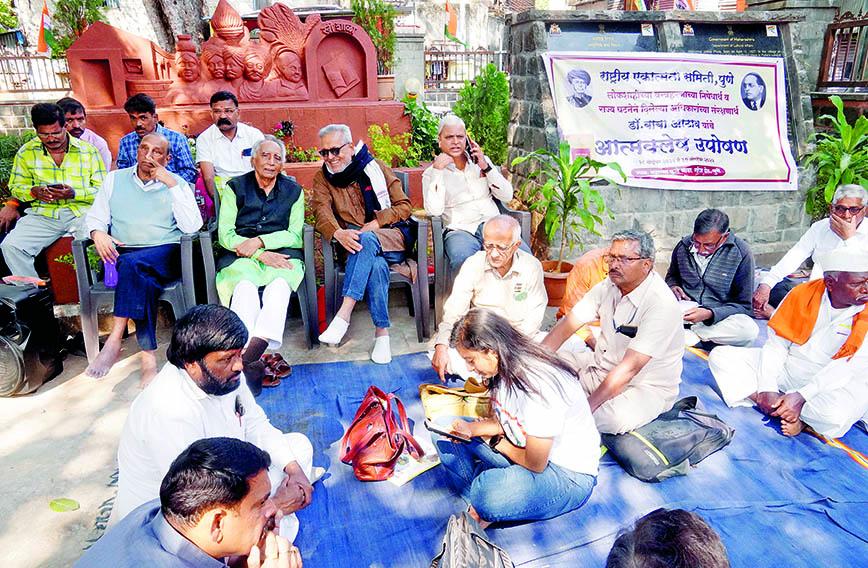
Dr Baba Adhav and members of the Mathadi Workers Federation pointed out that the amendment was unnecessary
Hamals resent change in ‘their’ law in Maharashtra
Rina Mukherji, Pune
A law that protects the rights of casual labour in Maharashtra has been amended, prompting concerns that it has been weakened. There have been protests by hamals or head-loaders and porters who feel their federation should have been consulted.
The original law was a visionary piece of legislation passed in 1969 and came out of the efforts of Dr Baba Adhav, a physician, who noticed that hamals suffered serious health problems because of hard physical labour.
Called the Mathadi, Hamal, and Other Manual Workers Act, it was the first labour law in India to provide social security, provident fund and gratuity to hamals, porters, and street-level daily wage workers in Maharashtra. It has stood the test of time, says Dr Baba Adhav, president of the Maharashtra State Mathadi Workers Federation.
So when the Maharashtra government presented the 34th Amendment to the Mathadi Act in the Legislative Assembly in March, without consulting the federation, there was outrage followed by street protests.
The Act stipulated that a tripartite board be set up with representatives of employers, workers, and the government. Workers would be registered and ensured all benefits, including maternity relief for women workers. The Act guaranteed no minor would be employed, and every worker would get a minimum wage if full employment was not available.
According to Labour Minister Akash Phundkar, the amendment is meant to bring about transparency in administering the Act, and curb “bogus workers” from taking advantage of the Act’s social security provisions. The government, he claims, wants to undertake “digital cleansing” of workers’ registrations, and put an end to harassment and extortion of employers by “gangs of bogus workers”.
The amendment, notably, has done away with the term “unprotected worker” which earlier had limited the provisions of the Act to head-loaders, porters and specific daily wagers between 18 and 60 years of age. It also defines manual work as “that which is done without the help of machines”.
Subhash Lomte, general secretary of the federation, refutes the government’s arguments for amending the Act. “If the government wanted to end harassment by goondas and gangs of bogus workers, it could have easily done so. Why did they need an amendment? Incidentally, the amendment has no provisions to check this.”
As for employers getting harassed in various districts, Lomte asks, “Are these employers registered with the Mathadi Board? If they were, we could have dealt with the problem.”
The tripartite Mathadi Board was given powers to adjudicate financial disputes between employers and workers, doing away with the need to approach the courts. An Advisory Committee set up by the state government comprising representatives of employers, workmen, and the state is to be appointed by the government in case any advice is to be sought in matters of administration of the Act.
Under the Act, all contractors, employers, and industrial enterprises in the state must mandatorily register with a District Mathadi Board when they use the services of head-loaders. Cloth markets, vegetable markets, central and state enterprises, cooperatives, mandis, and industries under the Maharashtra Industrial Development Corporation (MIDC) all come under the purview of the Act.
There have been lacunae in implementation of the Act. For instance, there are an estimated three million mathadis (head-loaders) all over Maharashtra. Yet, only 100,000 mathadis or so are registered with District Mathadi Boards.
Lomte questions the government’s talk of transparency, and ensuring smooth functioning of the Mathadi Act. “District Mathadi Boards were supposed to have representatives of the government, employers and workers. Each board was to have a term of three years. The government later increased the term to five years. But in many districts, after the expiry of their term, members or representatives are not appointed for 10-15 years,” he points out.
In the absence of the board, its powers get vested in the Deputy or Assistant Labour Commissioner, who starts functioning as a one-member Mathadi Board.
“Why can’t the government appoint representatives on time? Or else, the earlier board can be allowed to function till a new Mathadi Board is appointed,” says Lomte.
Similarly, he says, the state-level Advisory Board is supposed to comprise an equal number of workers, employers, and elected representatives, led by the Chief Labour Commissioner and Labour Minister.
“If that's not done, you will find politicians appointed to the boards instead of workers and trade union representatives. Rather than address its own slackness, the government amended the Mathadi Act,” added Lomte.
The erosion of the powers of the Mathadi Board, especially its tripartite constitution, has been a matter of concern for several decades.
The federation is particularly incensed about employers not getting themselves registered with the Mathadi Boards, despite extensively using head-loader services.
“The sugar industry remains totally unregistered. So do 90 percent of industries in the MIDC sector,” says Lomte. “This defeats the basic premise of the Act, and impedes social justice. Besides, it also prolongs disputes. Solutions are then sought in tribunals and courts, instead of being quickly adjudicated by the Mathadi Board. Yet, the government has been lackadaisical in looking into these issues. ”
The federation questions the new definition of manual work as work done without the help of machines. “The head-load is carried by the manual worker, and dumped on the machine. If the government was particular, we could have negotiated the payment. Was redefining manual work needed?”
Comments
Currently there are no Comments. Be first to write a comment!





